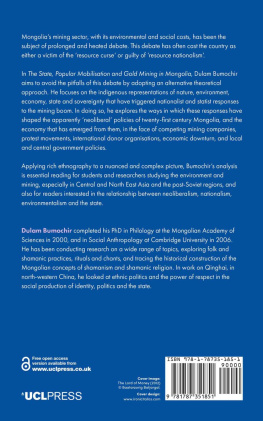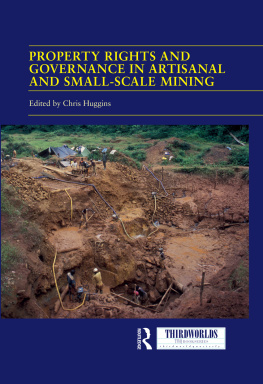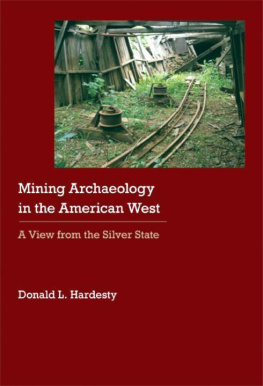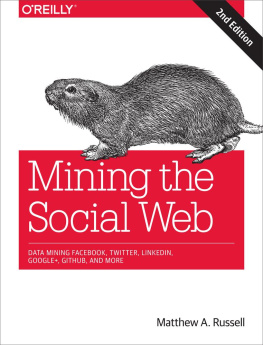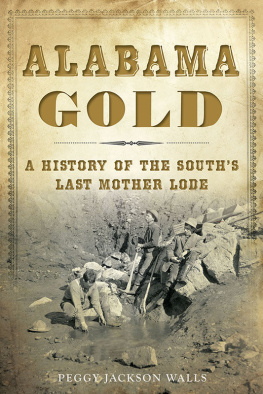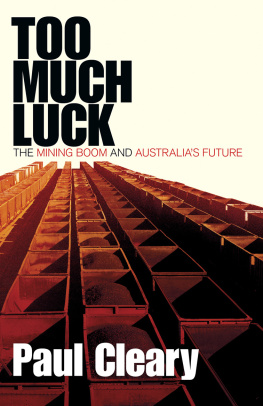The State, Popular Mobilisation and
Gold Mining in Mongolia
The State, Popular Mobilisation and Gold Mining in Mongolia
Shaping Neoliberal Policies
Dulam Bumochir
First published in 2020 by
UCL Press
University College London
Gower Street
London WC1E 6BT
Available to download free: www.uclpress.co.uk
Dulam Bumochir, 2020
The author and editor has asserted his rights under the Copyright, Designs and Patents Act 1988 to be identified as the author of this work.
A CIP catalogue record for this book is available from The British Library. This book is published under a Creative Commons 4.0 International licence (CC BY 4.0 International). This licence allows you to share, copy, distribute and transmit the work; to adapt the work and to make commercial use of the work providing attribution is made to the authors (but not in any way that suggests that they endorse you or your use of the work). Attribution should include the following information:
Bumochir, Dulam. 2020. The State, Popular Mobilisation and Gold Mining in Mongolia: Shaping Neoliberal Policies. London: UCL Press. DOI: https://doi.org/10.14324/111.9781787351837
Further details about Creative Commons licences are available at http://creativecommons.org/licenses/
Any third-party material in this book is published under the books Creative Commons licence unless indicated otherwise in the credit line to the material. If you would like to re-use any third-party material not covered by the books Creative Commons licence, you will need to obtain permission directly from the copyright holder.
ISBN: 978-1-78735-185-1 (Hbk)
ISBN: 978-1-78735-184-4 (Pbk)
ISBN: 978-1-78735-183-7 (PDF)
ISBN: 978-1-78735-186-8 (epub)
ISBN: 978-1-78735-187-5 (mobi)
DOI: https://doi.org/10.14324/111.9781787351837
Contents
List of acronyms
| ADB | Asian Development Bank |
| CGM | Cold Gold Mongolia |
| ERC | European Research Council |
| FDI | Foreign direct investment |
| FN | Fire Nation |
| HWPC | Homeland and Water Protection Coalition |
| IMF | International Monetary Fund |
| GDAT | Group for Debates in Anthropological Theory |
| KAS | Konrad-Adenauer-Stiftung |
| MDP | Mongolian Democratic Party |
| MNMA | Mongolian National Mining Association |
| MNPC | Mongolian Nature Protection Coalition |
| MPR | Mongolian Peoples Republic |
| MPRP | Mongolian Peoples Revolutionary Party |
| MRPAM | Mineral Resources and Petroleum Authority of Mongolia |
| NUM | National University of Mongolia |
| ORM | Ongi River Movement |
| OT | Oyu Tolgoi |
| PRC | Peoples Republic of China |
| TAF | The Asia Foundation |
| TNCs | Transnational corporations |
| UCL | University College London |
| UMMRL | United Movement of Mongolian Rivers and Lakes |
| US | United States |
| WB | World Bank |
Note on transliterations
For Mongolian Cyrillic transliteration, I adopted the MNS 5217:2012 standard approved by the National Council of Standardisation (Standartchillyn ndesnii zvlol 2012) of Mongolia. For Mongolian names of people, however, I had to follow the system General Authority for State Registration of Mongolia adopted to print names on Mongolian passports, which is the widely accepted system to write contemporary Mongolian names. The main difference between the MNS 5217:2012 standard and the registration authority standard appear in Mongolian Cyrillic letters such as , and . In the state registration authority standard, the transliteration of the Mongolian Cyrillic is U which is not different from the transliteration of the Mongolian Cyrillic and . In the MNS 5217:2012 standard, the transliteration of the Mongolian Cyrillic is , while the transliteration of the Mongolian Cyrillic is and is U. For example, the name is Munkh, not Mnkh, in the state registration authority standard which I adopt in this book. Also, in the case of some well-known Mongolian names and words, I followed the most widely accepted versions in English literature. For example, , which should be Buriad in the MNS 5217:2012 standard, often appears as Buryat in English literature. For Mongolian classical script, known as Uyghur, Vertical or Old Mongolian script, I adopted B. I. Vladimirtsovs (1971) system, except Q replaces KH, SH replaces , and GH replaces in some words that are already established.
Acknowledgements
I could not have written this book without the generosity, compassion, affection and trust of the many people who supported and shaped not only this book but also the period of my professional and personal life during the time it took to research and write it. First, I sincerely appreciate those who trusted and shared their life experiences, feelings, faith and hope during my fieldwork in Mongolia, and permitted me to write about them and their lives. Many of the prominent figures that I depict in this book in the protest movements, in mining and in politicshave differing relationships that can lead to disagreements and conflicts, and they expect reactions of different readers who might critique, judge and blame them; still, all of them kindly allowed me to depict them here. For this reason, I ask readers to respect the actions, decisions and beliefs of the different agents and actors who will appear in this book.
One of those prominent figures is Munkhbayar Tsetsegee, a founder and leader of the river movements. Together with his family, he welcomed me and my colleague Byambabaatar Ichinkhorloo to stay at his home during my field trips in Saikhan-Ovoo, Dundgovi, in the south of Mongolia. I also thank Bayarsaikhan Namsrai, another prominent founder of the movement, and Dashdemberel Ganbold, a lawyer of the movement, for providing invaluable information and research materials. The time I spent with these people in the movement helped me to discover the true meanings and realities behind the tag green terrorists. I was also able to uncover their concerns and relentless fight to protect the environment and lives of local people.
I received invaluable help from some people in the mining industry, in order to depict the other side of the story. I sincerely thank Orgilmaa Zundui-Yondon and Danny Walker for permitting me to conduct field research at their gold mine site in Zaamar, in the central region of Mongolia. I was impressed with their advanced mining and rehabilitation technology, as well as their sincere efforts, time and deeds that they have dedicated to rehabilitate the environment. The same also applies to Chinbat Lhagva, a former geologist and miner, founder of Gantsuurt company, and his daughter (and my friend) Nomin Chinbat, and her husband (and my friend) Bat-Erdene Gankhuyag. I am grateful for their help as I tried to educate myself in the fields of geology and mining.
In addition to those involved in the river movements and the mining industry, many other people helped shape this work. These include many technocrats and politicians, namely, Algaa Namgar, a metallurgical engineer and a director of the Mongolian National Mining Association (MNMA), and Jargalsaikhan Dugar, a mining economist and a former director of MNMA, who provided inestimable research materials and helped me to conduct field research. I am grateful to Algaa and Jargalsaikhan for helping me to meet and interview other people who had important political positions in the ruling institution of Mongolia those are Ochirbat Punsalmaa, a former president of Mongolia and a mining engineer, and Byambasuren Dash, a former prime minister and economist who ruled Mongolia in the 1990s. Their insights about the rule of the country after the collapse of socialism made a significant contribution as I worked to write about political independence, geopolitics and national economy.
Next page
